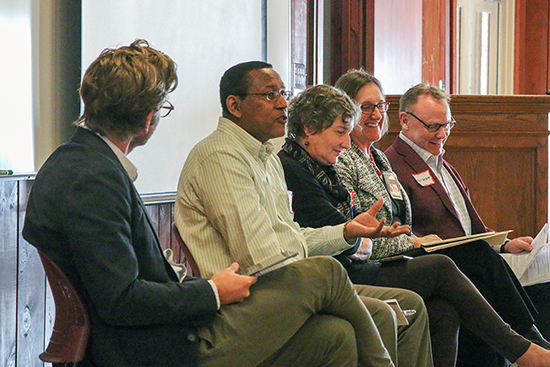Faculty members from the Indiana University School of Public Health-Bloomington, Fairbanks School of Public Health, Kelley School of Business, IU School of Nursing, Office of the Vice President for International Affairs and IU School of Medicine joined the IU Center for Global Health Equity at Bradford Woods to share information and develop strategies to promote and grow IU’s robust global health impact.
“IU’s visionary leadership in establishing equitable global health partnerships spans more than three decades and includes the AMPATH partnership in Kenya as well as robust collaborations with partners in countries around the world and underserved communities in Indiana,” said Adrian Gardner, MD, MPH, director of the IU Center for Global Health Equity. The center provides resources and facilitates collaborations for faculty throughout the university. The center is committed to growing the global health impact of IU through research, faculty support, education, care and service programs and translation of research into policy and practice.
The global health retreat gave faculty members the opportunity to provide specifics about their own initiatives in service, training and research as well as potential opportunities to collaborate to grow new and existing partnerships. Chandy John, MD, MS, Ryan White Professor of Pediatrics at the IU School of Medicine, opened the day by posing questions related to the ethics of global health partnership such as how to manage research paper co-authorship and how to discuss a disease that might not initially be thought important by a community because of a lack of resources or information to identify that disease in the community.
A panel of faculty experts also provided advice on resources and expertise that exist within various schools and centers for faculty members who are working on health issues globally. These ranged from experiential learning opportunities to multi-institutional international development grants from the U.S. government. Faculty members also discussed resources that are needed and potential challenges to growing IU’s global health leadership.
Individual faculty presented on global health projects related to:
- drowning safety education (William Ramos, PhD)
- mental health in Kenya (Matthew Turissini, MD)
- dentistry global service learning (Jeffrey Steele, DDS)
- medical trainee global health education at IU (Jenny Baenziger, MD)
- global health degrees at Fairbanks (Sherri Bucher, PhD)
- opioid availability worldwide (James F. Cleary, MBBS)
- substance use research (Gerardo Maupomé, BDS, MSc, PhD)
- poverty alleviation interventions and microfinance (Molly Rosenberg, PhD, MPH)
- HIV research (John Humphrey, MD)
- medication access in Botswana (Christopher Chen)
“There is incredible talent in this room,” said Dr. Gardner. “Clearly, we are all stronger together. It’s not about care, education or research operating in silos—it really takes all of us, particularly in the context of building equitable partnerships.”
The IU Center for Global Health Equity invites faculty members interested in global health to become affiliated faculty members and join the effort to align talent and resources to achieve the center’s mission of “developing mutually beneficial partnerships across disciplines, schools and countries for the primary purpose of creating and implementing sustainable programs that improve health and human flourishing in underserved areas worldwide, and preparing a critical mass of health education and health research experts in these communities to become the next generation of local, national and global health leaders.”



